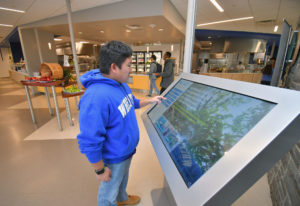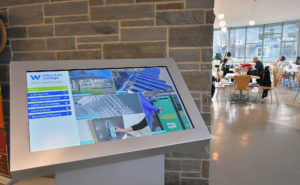Saving the world, one disposable bottle at a time

Do you know how many watts of energy Wheaton is generating right this second from its new 10-acre solar farm and rooftop solar panels? How many disposable plastic water bottles have been kept out of the waste cycle since two dozen filtered-water filling stations were installed on campus?
No need to guess. The information is now at your fingertips online from the college’s sustainability web page, which also is prominently displayed on a new touch-screen kiosk in the Chase Dining Hall entrance.
The web page with its live feed of energy output and the kiosk are the latest additions to Wheaton’s renewable energy and sustainability initiatives. Both highlight in a quantitative way the college’s commitment to preserving the environment, inspiring conservation mindfulness in tomorrow’s decision makers and saving on costs.
“Since 2005, Wheaton’s carbon emissions are down 23 percent, well on the way toward the goal of a 28 percent reduction by 2025, a target set by the 2015 Paris climate accord,” said Brian Douglas, executive vice president for finance and administration. We continue to focus on increased energy efficiency across the campus, with every intention of meeting the target by 2025, if not sooner.”

“As a college, we talk a lot about helping students lead social change. Sustainability is really about changing behavior, and our embrace of it provides students with a firsthand opportunity to develop their skills and to work to change their own behavior in pursuit of a shared goal,” Douglas said.
In fact, students have led and inspired some of the changes that have taken place on campus. For example, a student-run community garden, WheaFarm, provides students with the opportunity to grow fruits, vegetables and herbs while pursuing their larger mission of promoting food justice and sustainability. Also, the residents of the Environmentally Conscious Community Oriented (ECCO) House run a campus-wide composting program and host conversations about environmental conservation.
“Last semester, we hung long clotheslines from the side of our house to the garage to dry our clothes on,” said Rachel Crafford ’20, ECCO House co-president. “The weather and timing wasn’t great to start this in the fall, so we are hoping to rely more heavily on this method in the coming semester, limiting our reliance on electricity even further. There has also been talk at ECCO for a while now about a ‘zero power Sunday,’ where we don’t use lights, appliances or outlets for a full day once per week.”
Over the years, Wheaton has worked to improve its sustainability, with areas of focus evolving based on technological innovation, student interests and economic factors.
The most recent initiatives fall into five categories:
o Solar electric: The 10-acre solar farm on Wheaton’s Clapp Street parcel and rooftop solar panels on the old science center and the Haas Athletic Center installed in 2016–17. The farm alone provides enough electricity to power 4,650 homes and has the impact of reducing carbon emissions equivalent to taking 500 vehicles off the road.
o Solar hot water: The Haas center swimming pool and hot water for showers are now heated through a solar hot water system installed in 2017. (With Massachusetts state rebates, the project will pay for itself in less than two years, according to Douglas.)
o Environmentally-conscious building: The college’s two most recent major construction projects were designed to meet Leadership in Energy and Environmental Design (LEED) performance standards. The Mars Center for Science and Technology is certified LEED Gold and the Chase Dining Hall renovation has been certified as LEED Silver.
o Food and water: Students developed the WheaFarm residential theme house. The college dining program has a number of sustainability aspects—the Eco Café in Balfour-Hood emphasizes local and organic food, all dining hall food waste is saved and sent to a local farm for pigs, and a student-led partnership was created to offer re-usable to-go containers. Filtered water-bottle-filling and drinking stations have been installed across campus, saving the equivalent of nearly one million plastic water bottles from the waste cycle since 2016.
o Recycling and efficiency: Wheaton has implemented single-stream recycling, which simplifies the collection process; all laundry machines are high efficiency units that save thousands of gallons of water a year; and since 2015, more than 4,000 regular lighting fixtures have been replaced with LED fixtures to reduce electricity consumption.
Making the impact of these efforts more visible on campus could fuel other initiatives, which is why college officials are considering adding a kiosk in another location, Douglas said. “We hope it will spur more engagement, ideas and progress. We have much more work to do and would like to have more students help move us forward. “
